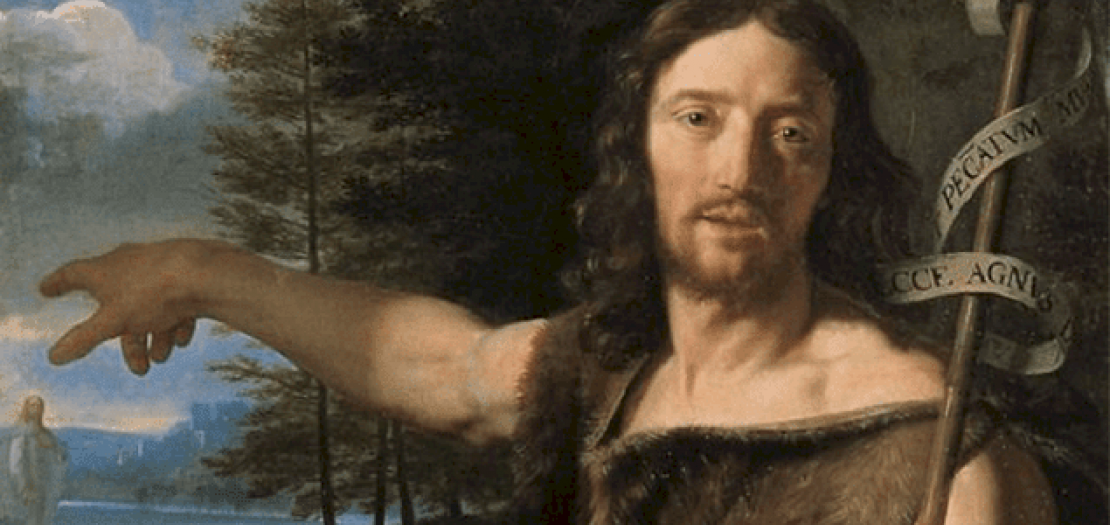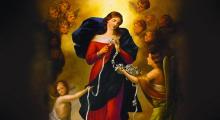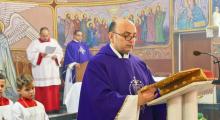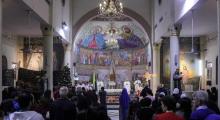Issued by the Catholic Center for Studies and Media - Jordan. Editor-in-chief Fr. Rif'at Bader - موقع أبونا abouna.org

Following is the text of the meditation by Latin Patriarch of Jerusalem His Beatitude Pierbattista Pizzaballa for the second Sunday of Advent, December 4, 2022:
As every year, on the Second Sunday of Advent, the liturgy presents us the figure of John the Baptist, the first of the two great figures that accompany our Advent journey.
To assist us in recognizing this, Matthew first gives us information about his clothes: John wore clothing made of camel’s hair and had a leather belt around his waist (Matthew 3:4). It’s not a mere annotation or an unimportant detail, but an obvious reference to the clothing of the prophet Elijah who, just at the beginning of his mission, is described as “a man covered with a hairy garment with a leather belt around his waist” (2Kings 1:8).
With this apparel connection, the evangelist appears to want to tell us: see, Elijah has returned, and that was the sign expected for centuries, the sign that states unequivocally the Messiah is coming. Because, according to the prophet Malachi (Mal 3:23), the Lord would send the prophet Elijah: “See, I will send the prophet Elijah to you before that great and dreadful day of the LORD comes” (Mal 4:5). Later, on two occasions (Mt 11:10; 17:10-13), Jesus will confirm this identification between Elijah and John.
This means that, with the appearance of John in the desert, all messianic expectation of the people of Israel is to about to take place, something great is about to happen.
Such news creates movement, expectation, awakens hope: the people go to the desert, a place of conversion and listening, to see this new Elijah sent from heaven.
And in the desert, John proclaims (3:1) “the kingdom of heaven is at hand.” That is, he confirms the good news that all were waiting, the news that God is drawing near, that He keeps His promises, that He is about to visit His people. “One is coming after me…” (3:11) says John.
If it is so that the kingdom is close at hand, then we must prepare ourselves to welcome it, and this is precisely the work of the Baptist. The evangelist Matthew is concerned to insert here the prophecy of Isaiah (Is 40:3), where a mysterious voice proclaims, “prepare the way of the Lord”, a “highway” on which the Lord would return.
The voice is now heard again, and it is the voice of the Baptist. All have the flavor of a fulfillment that is beginning to happen.
It is the time of preparing oneself. The Baptist gives some very sober and essential indications about the process of this preparation.
Above all, he warns of a great danger: that of thinking to be ready by now.
It is the danger of the Pharisees and Sadducees (Matthew 3:7 ff) who appear here for the first time in the Gospel. John interprets their thinking which is cradled in the idea that belonging to a people, to a tradition, is enough to feel secure, to feel right: “do not presume to say to yourselves, ‘We have Abraham as our father” (Matthew 3:9). There is no point in appealing to this.
So, the real impediment in encountering the Lord, is, paradoxically, not sin, but the presumption to be right.
Furthermore, John does not ask to do anything specific: it’s not necessary to fast, nor to practice asceticism, nor to fulfill rites. Simply, one must convert.
The word conversion is a keyword of today’s Gospel: it occurs three times.
What does it mean to convert? It is what the people that come to John do spontaneously: “they were being baptized by him in the Jordan River as they acknowledged their sins” (Matthew 3:6). Converting means entering a humble attitude that recognizes one’s unworthiness, the evil that lives there, the real need for salvation that opens one to the mercy of the Lord. For the evangelist Matthew, it’s the only way to prepare the way of the Lord.
It would seem so simple, and yet we know it’s not so.
Finally, the Messiah awaited by John the Baptist is first a judge and we understand it from the images that he uses to describe it: the ax placed at the root that cuts the trees that do not bear fruit (v.10); the winnowing fan that clears the threshing floor and burns the straw (v.12). They are images of a judge who does not use mercy but solves the problem of evil and sin just as everyone expected, just as man, on his own, can imagine by eliminating sin and sinner. They are words that also have a load of violence.
It will not happen exactly as he foresaw and the first to be surprised by this new and different Messiah will be the Baptist. He, who in today’s Gospel is so sure of himself and clear, from his prison cell, perplexed by what he hears about Jesus, Who does and says unforeseen and different things, will send his disciples to ask him: “Are you He who must come or must we expect another? (Matthew 11:3). Are you really the one whose coming I announced in the Jordan when I called the people to conversion?”
In his answer, Jesus reminds him of the prophecies of Isaiah that we read in these Advent days: “The blind regain their sight, the lame walk, the lepers are purified, the deaf hear, the dead rise, the Gospel is announced to the poor” (Matthew 11:5). Yes! Jesus says, it is I, and I am doing what was written. He invites him to return to the true meaning of His coming, which is announced by the prophet Isaiah. Jesus, in other words, invites him to free himself of small personal expectations, to leave room for His word of salvation.
And this will be the personal conversion of the Baptist. And, perhaps, it should also be a little ours.
+ Pierbattista







